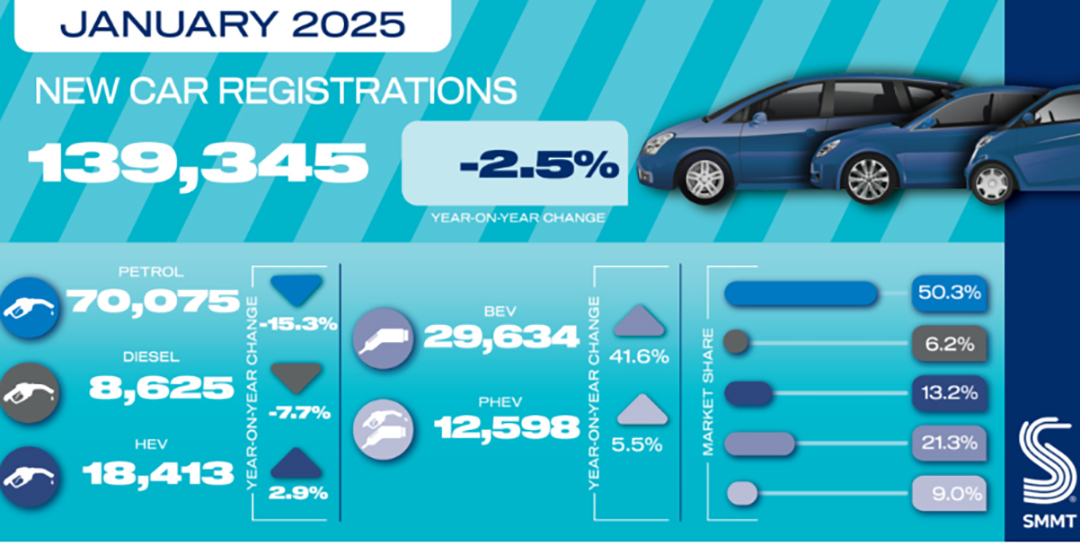As the world grapples with the pressing challenges of climate change and environmental degradation, the automotive industry is undergoing a major transformation. The latest data from the UK shows a clear decline in registrations for conventional petrol and diesel vehicles, with petrol registrations down 15.3% and diesel registrations down 7.7% in January 2023. In stark contrast, hybrid electric vehicles (HEV) and plug-in hybrid electric vehicles (PHEV) have seen a significant increase in market share, reflecting a broader trend towards new energy vehicles (NEVs) around the world. This shift not only highlights the urgent need for sustainable transport solutions, but also provides opportunities for international collaboration, particularly with leading Chinese automakers.

CONVENTIONAL VEHICLE REGISTRATIONS DROP
The figures for the UK car market speak for themselves. Petrol car registrations fell to 70,075 units, accounting for just 50.3% of the market, a significant drop from 57.9% in the same period of 2024. The story was similar for diesel cars, with registrations falling to 8,625 units, accounting for 6.2% of the market, a slight drop from 6.5% the year before. In contrast, sales of hybrid cars increased by 2.9% year-on-year to 18,413 units, while plug-in hybrids grew by 5.5% to 12,598 units. Most notably, pure electric car registrations soared by 41.6% to 29,634 units, accounting for 21.3% of the market, up from 14.7% in 2024. Despite this growth, the UK government's target of a 22% market share for electric vehicles by 2024 has not been achieved, highlighting the need for further incentives and support for consumers to make the transition to lower-emission vehicles.
GROWTH AND JOBS
The rise of new energy vehicles is not just a trend, but also a catalyst for economic growth and job creation. The rapid development of the new energy vehicle industry has stimulated the innovation of related technologies, strengthened the industrial chain, attracted a lot of investment, and promoted the economic transformation of various countries. The production and sales of new energy vehicles require a large number of labor, thus creating a large number of jobs, especially in battery manufacturing, charging infrastructure development and after-sales service. This shift to new energy vehicles is reshaping the labor market, requiring new skills and capabilities, and also bringing challenges to jobs in the traditional automotive industry.
As countries move toward sustainable transportation, the demand for a skilled workforce in the NEV industry will only increase. This shift presents a unique opportunity for countries to invest in workforce development programs that equip individuals with the skills they need to thrive in this growing industry. By developing a skilled workforce, countries can ensure they remain competitive in the global NEV market while addressing job losses in the traditional automotive industry.
INTERNATIONAL COMPETITION AND COOPERATION
The global NEV market is highly competitive, with countries vying for technological advantage and market share. As demand for sustainable transportation solutions continues to grow, countries are implementing policies to enhance the competitiveness of their domestic NEV industries. Against this backdrop, partnerships with established companies, especially Chinese automakers, can offer significant advantages. China has emerged as a leader in NEVs, with its companies at the forefront of innovation and production. By establishing partnerships with Chinese companies, countries can leverage their expertise, technology, and supply chain efficiencies to accelerate their own NEV initiatives.
In addition, international cooperation can promote knowledge sharing and best practices, enabling countries to develop a strong NEV ecosystem. Collaborative efforts can also lead to the establishment of standardized regulations and infrastructure, which are essential for the widespread adoption of NEVs. As countries work together to promote sustainable transportation, they can jointly address the challenges posed by climate change and contribute to global efforts to reduce greenhouse gas emissions.
Conclusion: A unified approach to sustainable transport
The transition to new energy vehicles is a pivotal moment for the automotive industry, with far-reaching implications for economic growth, jobs and environmental sustainability. The decline in conventional car registrations in the UK and the growing popularity of new energy vehicles show that the momentum for change is undeniable. However, to fully realize the potential of this transition, countries must take a unified approach, emphasizing cooperation and partnership, especially with China's leading automakers.
By working together, countries can create an enabling environment for the development of the new energy vehicle industry, promote innovation, create jobs and promote sustainable economic development. Now is a good time for countries to seize the opportunities brought by new energy vehicles and guide their policies towards a greener and more sustainable future. Through international cooperation and strategic partnerships, the global community can pave the way for a cleaner and more efficient transportation pattern, thereby benefiting the economy and the environment.
Email: edautogroup@hotmail.com
Phone / WhatsApp: +8613299020000
Post time: Feb-14-2025


